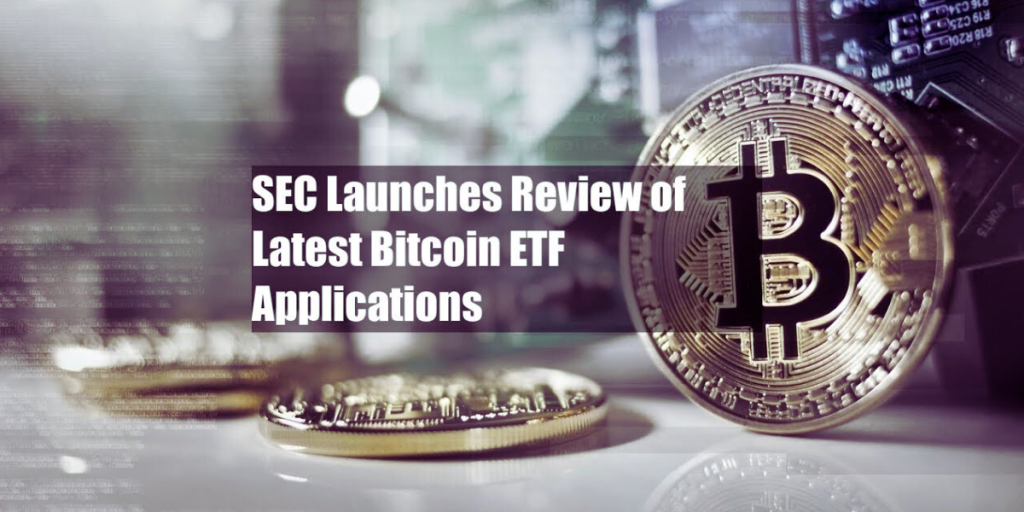SEC’s review of the latest Bitcoin ETF applications

As of my last knowledge update in September 2021, I don’t have access to real-time information or updates. However, I can provide you with some general information on the topic of the SEC (U.S. Securities and Exchange Commission) reviewing Bitcoin ETF (Exchange-Traded Fund) applications.
The SEC has been reviewing and considering various Bitcoin ETF applications over the years. An ETF is a financial product that tracks the price of Bitcoin and allows investors to gain exposure to Bitcoin without directly owning it. The SEC’s primary concern with these applications has been related to investor protection, market manipulation, and the overall regulatory framework for cryptocurrencies.
To get the latest information on the SEC’s review of Bitcoin ETF applications, I recommend checking reputable financial news websites, official SEC announcements, or conducting a web search with up-to-date keywords related to the topic. This will provide you with the most current and accurate information regarding the SEC’s actions and decisions regarding Bitcoin ETFs.
How does the SEC review Bitcoin ETF applications
The SEC (Securities and Exchange Commission) reviews Bitcoin ETF (Exchange-Traded Fund) applications by evaluating whether they meet the requirements of the Securities Act of 1933 and the Securities Exchange Act of 1934.
The SEC examines the proposed ETF’s compliance with the rules and regulations of the securities market, its ability to prevent fraud and manipulation, and its potential impact on investor protection.
Additionally, the SEC considers whether the ETF is designed to prevent market disruption and whether it has sufficient liquidity to function effectively.
Overall, the SEC’s review process for Bitcoin ETF applications is thorough and rigorous, as they aim to protect investors and maintain the integrity of the securities market.
the criteria for approval or rejection of Bitcoin ETFs
The Securities and Exchange Commission (SEC) has not yet established a clear set of criteria for the approval or rejection of Bitcoin ETFs. However, the SEC has stated that it will evaluate each application on a case-by-case basis, taking into account factors such as market liquidity, custody of assets, and potential manipulation. The SEC has also expressed concerns about the volatility and lack of regulation in the Bitcoin market. Ultimately, the decision to approve or reject a Bitcoin ETF application rests with the SEC, and there is no guarantee of approval for any given application.
How long does the SEC’s review process typically take?
The SEC’s review process for Bitcoin ETF applications can vary in length, and there is no set timeline for approval or denial. In general, the review process can take several months to a year or more, depending on various factors such as the complexity of the application and the level of public interest or concern. It’s important to note that the SEC conducts a thorough evaluation of each application to ensure that it meets all regulatory requirements and protects investors’ interests.
the potential implications of the SEC approving a Bitcoin ETF
If the SEC were to approve a Bitcoin ETF, it could have several potential implications.
Firstly, it would provide a more accessible way for traditional investors to gain exposure to Bitcoin without having to directly purchase and store the cryptocurrency themselves. This could lead to increased demand for Bitcoin and potentially drive up its price.
Secondly, it could help to legitimize Bitcoin as an asset class and increase its mainstream adoption. This could lead to more businesses accepting Bitcoin as a form of payment and more individuals investing in it.
However, there are also potential risks and downsides to a Bitcoin ETF. It could increase volatility in the cryptocurrency market as more investors enter and exit positions. There is also the risk of market manipulation and fraud, which the SEC would need to closely monitor and regulate.
Overall, the approval of a Bitcoin ETF by the SEC could have significant implications for both the cryptocurrency market and the broader financial industry.


